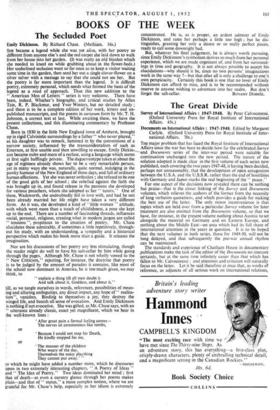BOOKS OF THE WEEK
The Secluded Poet
Emily Dickinson. By Richard Chase. (Methuen. 16s.) SHE became a legend while she was yet alive, with her poetry so different from anyone else's and the red carpet she laid down to walk from her house into het garden. (It was really an old blanket which she needed to kneel on while grubbing about in the flower-beds.) Her underlined seclusion went so far once as to keep a visitor waiting some time in the garden, then send her out a single clover-flower on a silver salver with a message to say that she could not see her. But the poetry is far more important than the legend. It is difficult poetry, extremely personal, which needs what formed the basis of the legend as a road of approach. Thus this new addition to the " American Men of Letters " series is very welcome. There have been, indeed, Whicher's biography, and critical studies by Allen Tate, R. P. Blackmur, and Yvor Winters, but no detailed study ; and there is to be a complete edition of her work, letters and un- published manuscripts, and the poems in variorum form by Mr. T. H. Johnson, a correct text at last. While awaiting these, we have the present collections, and this illuminating commentary by Professor Chase.
Born in 1830 in the little New England town of Amherst, brought up in rigid Calvinistic surroundings by a father " who never played," as his daughter was to remark, hemmed in by the conventions of a narrow society, influenced by the transcendentalism of such as Emerson, at first unable and then unwilling to escape, Emily Dickin son became mate and more of a recluse, using a language which seems at first sight bafflingly private. The daguerreotype taken at about the age of eighteen already shows her to be a very remarkable person, yet in ninny ways she was, naturally, quite normal, indulging in the pawky humour of the New England of those days, and full of ordinary human affections. Yet she was never orthodox ; she refused to be one of the good girls of her school ; she rebelled against the faith she was brought up in, and found release in the passions she developed for various preachers, whom she adopted as her " tutors." One of these, Wadsworth, she undoubtedly fell in love with, and had he not been already married her life might have taken a very different form. As it was, she developed a kind of "little women " attitude, with which went more than a touch of childishness, a pose she kept up to the end. There are a number of fascinating threads, influences social, personal, religious, creating what in modem jargon are called " tensions ", propitious to the creation of poetry. Mr. Chase elucidates these admirably, if sometimes a little repetitively, through- out his study, with an understanding, a sympathy and a historical perspective which makes his book more than a guide. It releases the imagination.
Nor are his discussions of her poetry any less stimulating, though the reader might do well to have his salt-cellar by him while going through the pages.- Although Mr. Chase is not wholly vowed to the New Criticism," rejecting, for instance, the doctrine that poetry is to be judgid by the amount of paradox it contains, like most of the school now dominant in America, he is too much given, we may think, to " explain a thing till all men doubt it
And talk about it, Goddess, and about it,"
till, as we tangle ourselves in words, references, possibilities of mean- ing and alluring ambiguities, any direct impact, any hope of " realisa- tidn", vanishes. Binding to themselves a joy, they destroy the winged life, and banish all sense of evocation. And Emily Dickinson is nothing if not evocative. She was gifted, as Mr. Chase says, with an " utterance already classic, exact yet magnificent, which we hear in the well-known lines :
After great pain a formal feeling comes— The nerves sit ceremonious like tombs, ' Because I could not stop for Death, He kindly stopped for me,
or "The manner of the children Who weary of the day, Themselves the noisy plaything They cannot put away.' " io which he might have added a number more, which he discourses ;Ilion in two extremely interesting chapters, " A Poetry of Ideas " and " The Idea of Poetry." Two ideas dominated her mind • first that of death—as even a cursory glance through her poems makes plain—and that of " status," a more complex notion, where we are grateful for Mr. Chase's help, especially as her idiom is extremely OT concentrated. He is, as is proper, an ardent admirer of Emily Dickinson, and rates her perhaps a little too high ; but he dis- tinguishes, granting her only a dozen or so really perfect pieces, ready to call some downright bad.
But, whatever his final judgement, he is always worth pursuing, since Emily Dickinson's symbolism derives so much from her personal experience, which we are made cognisant of, and from her surround- ings in time and geography. It is not always pOssible to accept his elucidations—why should it be, since no two persons' imaginations work in the same way ?—but that after all is only a challenge to one's own perspicacity. Certainly this book is one that no lover of Emily Dickinson can afford to miss, and is to be recommended without reserve to anyone wishing to adventure into her realm. But don't


























 Previous page
Previous page